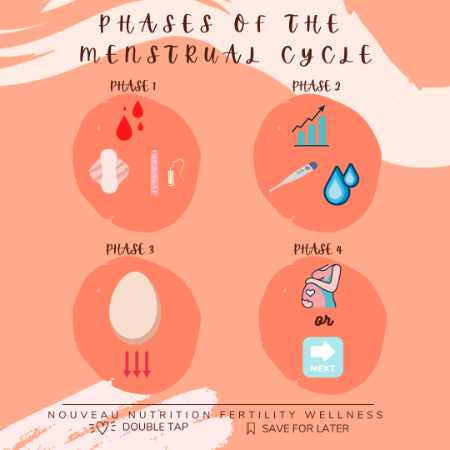Phases of the Menstrual Cycle
/Ever wondered how the menstrual cycle works or why you may experience certain physical or psychological symptoms during your period? Why am I crying so much? Why do I want to kill everyone around me? Why are my jeans SO tight? Well, I am here to explain to you the 4 phases of the menstrual cycle and how they may impact you throughout the month.
Everyone’s cycle is different, but the average cycle lasts about 28 days. The timeline below will reflect a 28-day cycle without any hormonal birth control.
The 4 Phases of the Menstrual Cycle
Phase 1 (days 1-7): Follicular phase:
Day 1 is your first day of full flow of your period. The first phase of your cycle is called menstruation - this is when your uterine lining sheds due to estrogen and progesterone dropping. Menstruation typically lasts around 2 days to 1 week. While you are menstruating, your estrogen is slowly rising and the endometrial lining is slowly thickening. During days 1-15 ish, estrogen is higher to help release the egg.
Phase 2 (days 7-14): Follicular phase:
The second phase is the proliferative phase. During this phase, estrogen is rising slowly, which stimulates the release of another hormone called follicle-stimulating hormone (FSH). FSH stimulates the ovaries to create a follicle to prepare for ovulation (baby-making time). During this time, testosterone is also coming out to help with getting your body ready for ovulation. Testosterone rising may give you acne (which sucks), BUT it is also increasing your libido (yeah!). Towards the end of this phase; estrogen, luteinizing hormone (LH) and Basal Body Temperature (BBT) will spike (days 12-14, may vary) which causes ovulation. Your cervical mucus will also start to say “hello”- you will notice a wetter feeling ...“down there”. If you see a raw egg white-looking substance that is stretchy and slippery - that is fertility gold aka “sexy time”! Sperm can live in your body for up to 5 days, so if you are only able to be intimate once, that could be all you need.
Phase 3 (~day 14): Ovulatory phase:
This phase called ovulation can last up to 24-36 hours. Your libido should be kicked into high gear and you will notice an increase in cervical mucus. Your follicle has matured and is producing estrogen to prepare for pregnancy. An egg is released from the follicle, which travels down the fallopian tube and hopefully meets up with some sperm. If that happens, an embryo is made and it will find its “comfy safe place” called the uterine lining and hopefully implants. If the sperm and egg do not fertilize or you are not trying to conceive, the egg will dissolve and pass out of the body during menstruation.
Phase 4 (days 15-28) Luteal Phase:
The final phase is called the luteal phase. Progesterone becomes the main hormone during this phase. If pregnancy occurs, progesterone continues to stay high to support the pregnancy by getting the uterine lining ready. If pregnancy does not occur, estrogen and progesterone drop and your menstrual cycle starts all over again.
Optimal and Low Progesterone Symptoms:
Optimal: Have you ever had days leading up to your period where you feel so happy and loving…..this means your progesterone is doing its job and it is at optimal levels.
Low: Have you ever had days leading up to your period where you have wanted to yell at any and everyone???? Sounds like PMS. This indicates that your progesterone is low and you should speak to your gynecologist.
If you are experiencing any symptoms like PMS, mood swings, fatigue out of nowhere, or other symptoms, let’s talk. These can be easy fixes or can be a sign that something more serious is taking place.
Sending fertility love 💗 and baby dust!
Love, your fertility sister...Kira
203.442.6027


